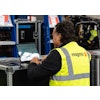
New research published by GS1 US, and conducted by Redpoint, reveals that supply chain professionals are highly confident (64%) or moderately confident (35%) in their ability to manage disruptions. However, confidence does not always equate to effective supply chain management, with nearly half (43%) reporting that they struggle to maintain supply chain visibility.
“Geopolitical tension, fluctuating demand and supply chain disruptions are putting immense pressure on organizations, forcing them to rethink and transform their supply chain strategies,” says Bob Carpenter, president and CEO, GS1 US. “To remain competitive, organizations must adopt greater agility, innovation and sustainability throughout the entire supply chain. Success now depends on real-time adaptability, enhanced visibility and operational innovation, all while maintaining a strong focus on sustainable business practices.”
Key takeaways:
Those companies with “high confidence” in their supply chains report having:
- Centralized systems to manage disruption in real time (56%), which is further improved when they trust the accuracy and consistency of data in centralized systems (68%).
- Full supply chain automation (72%), which gives the ability to manage supply chain agility very well (61%).
- The ability to handle consumer demand fluctuations very well (51%).
- GS1 Standards use, which makes them very confident in their ability to respond to supply chain disruption (77%).
The survey also showcases that companies that implement real-time tracking technologies are 68% more likely to report improved visibility and better inventory control. Additionally, while 99% of all companies consider sustainability to be important, only half have taken steps to implement sustainability practices within their supply chains. Those advancing sustainability initiatives are prioritizing:
- Waste management and recycling programs (52%)
- Sustainable packaging (48%)
- Certifications and impact accounting (48%)
- Sustainable sourcing of materials (45%)


















